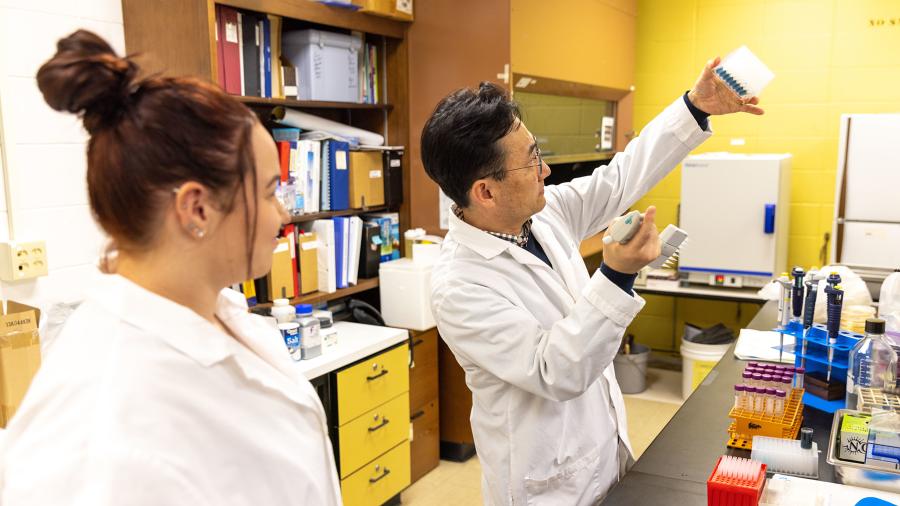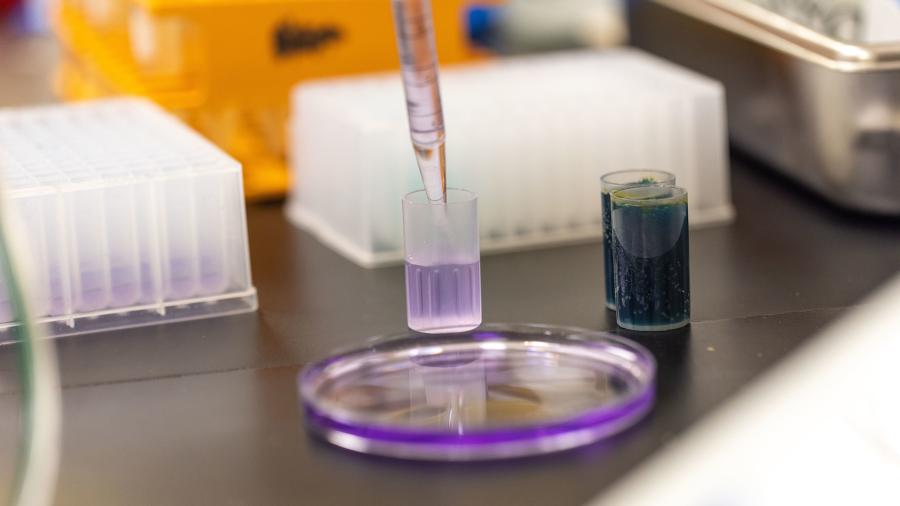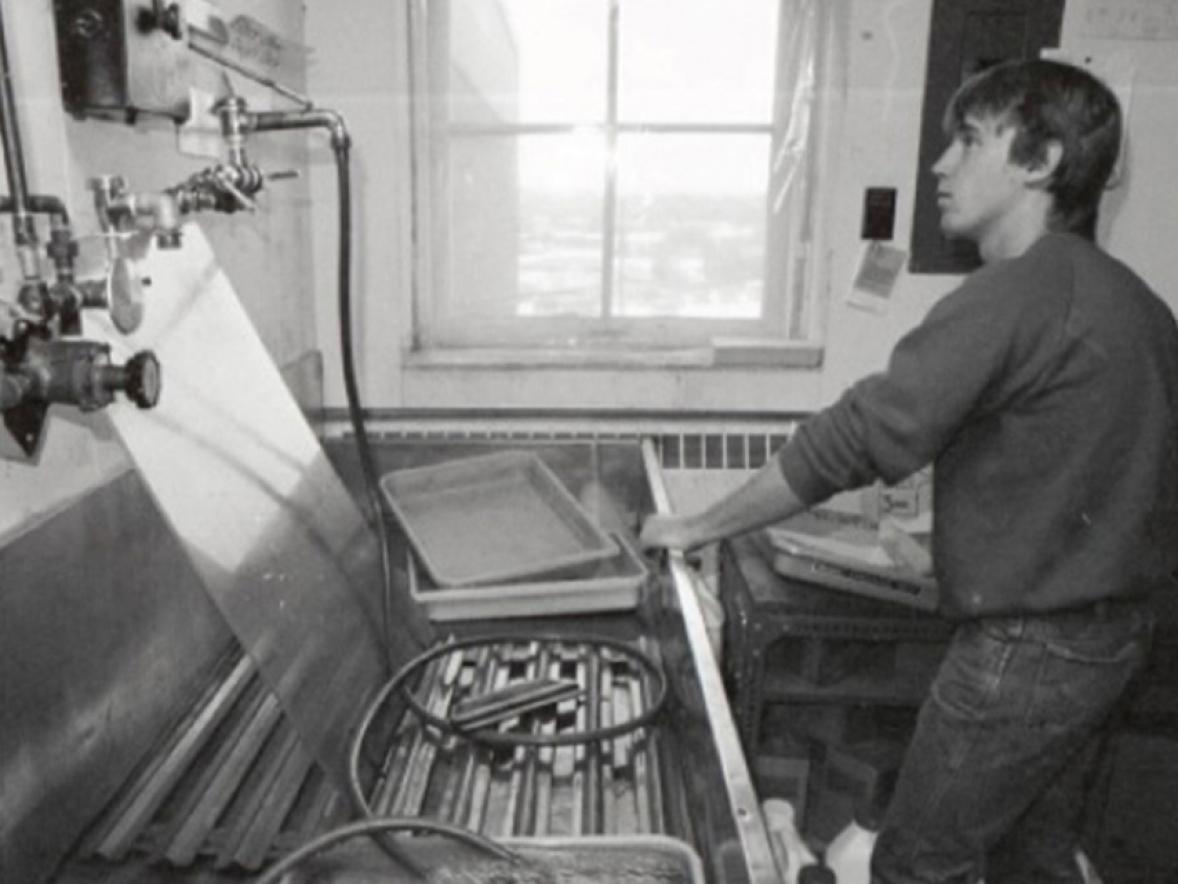A research spotlight will shine on nine UW-Stout students on Wednesday, March 8, at the state Capitol, including one whose efforts could help make water safer to drink and food safer to eat.
Dozens of UW System students will present at the annual Research in the Rotunda, held in the Capitol rotunda. The event is a chance for state leaders, legislators and others to learn about faculty-supported student efforts that may impact the state’s economy.
UW-Stout junior Caitlyn Lisota, a food science and technology major will explain research that could benefit consumers and the state’s large food processing industry.

She is part of a team led by Associate Professor Taejo Kim that is creating a rapid, ready-to-use, low-cost test kit for the bacteria E. coli and coliforms, a strain of which can cause serious illness. Two kits are being designed, one for consumers and another for commercial use.
The kits are in the testing stage, Lisota said. “I believe the research is important because it’s developing a kit that is more cost-effective and still is able to detect small cell numbers of E.coli/coliform.”
She joined the project as a first-year student. “I have gotten ample laboratory experience and been able to practice various laboratory skills and procedures that have helped prepare me for when I get a job in the food science industry,” she said.
This summer, she will have an internship at Hydrite in the state of Washington. She hopes to begin her career in the food science industry in quality assurance.

Lisota was the 2022 College of Education, Hospitality, Health and Human Sciences Outstanding Student Researcher — now the College of Arts and Human Sciences.
UW-Stout also has a master’s program in food science. Both programs will benefit from improved labs as part of the Heritage Hall renovation.
UW-Stout students presenting at Research in the Rotunda and their faculty advisers are:
- Kal Breeden, of Lakeville, Minn., majoring in environmental science, “Long-Term Efficacy and Stability of Trout Stream Habitat Restoration in the Red Cedar River Watershed”; advisers, Keith Gilland, Nicole Hayes, Innisfree McKinnon
- Broderick Frye, of Whitewater, professional communication and emerging media, “Predictable Patterns in Sports Journalism Headlines: Can AI Replicate the Expected Structure and Tone?”; Joleen Hanson
- Zachary Helget, of New Ulm, Minn., business administration, “Determinants of MSA-Level Employment and Wages”; Zach Raff
- Kacey King, of Hugo, Minn., human development and family studies, “Accessing Mental Health Services Across the Life Course: Barriers and Solutions”; Amanda Barnett
- Dylan Kostuch, of Amherst, applied science, “Seasonal Patterns of Nutrient Limitation in Two Hypereutrophic Reservoirs”; Gilland, Hayes, McKinnon
- Jordan Kunze, of Merrill, applied science, “Impact of Personal Care Products on Tensile Strength and Structure of Hair”; Matthew Ray
- Caitlyn Lisota, of Mukwonago, food science and technology, “Development of Rapid, Ready-to-Use, and Cost-Effective Water Test Kits for Detection of E. coli and Coliforms”; Taejo Kim
- Noah Royce, of Mattoon, applied science; applied mathematics and computer science, “Using Mathematical Modeling to Increase the Crop per Drop for Dark Red Kidney Beans”; Tyler Skorczewski, Keith Wojciechowski
- Britney Serafina, of Baldwin, environmental science, “Land Use and Conservation Practices Affect Stream Water Quality in the Red Cedar”; Gilland, Hayes, McKinnon
King studied the increase in need for mental health services since the COVID-19 pandemic. Up to 20% of Americans are experiencing mental health illness at any given time, with half of them not receiving treatment.
Barriers to treatment increase the risk of suicide for both older and younger adults, King found. Major barriers include lack of social support, availability of telehealth and access to health insurance.
“Having access to needed mental health services is correlated with a healthy workforce, which can help build our local, regional and national economy,” said King, who has a video discussing her research.
Each UW System university is allowed six students at Research in the Rotunda, but UW-Stout has nine because Breeden, Kostuch and Serafina are presenting as part of the Freshwater Collaborative of Wisconsin. UW-Stout received FCW grants in 2022 totaling nearly $400,000.
Students were nominated for the event by faculty and staff. Nominations, including a research abstract, were scored by a student research committee.
Faculty-led research is one aspect of the experiential learning required in all UW-Stout undergraduate and graduate programs and part of the university’s polytechnic advantage.
Faculty, staff also attending
Attending the event with the students will be UW-Stout Chancellor Katherine Frank, Provost Glendalí Rodríguez, several staff and many of the faculty advisers.
“Research in the Rotunda is such an important yearly event, as it gives our UW-Stout students a high-profile platform to convey their research with ideas that could ultimately benefit both the people of Wisconsin and the world,” said Anne Hoeltke, director of UW-Stout’s Office of Research and Sponsored Programs, who will be attending.
“The ability to share research with legislators provides an opportunity to highlight the importance of research and the economic impact on the state,” she said.
Research at UW-Stout by students, faculty and staff is coordinated through ORSP, which provides grants funded by Stout University Foundation.
ORSP also oversees publication of the annual Journal of Student Research.
Copies of the journal will be available on Tuesday, May 2, at UW-Stout’s annual Research Day, where more than 100 student projects will be presented. Additional work by School of Art and Design students will be presented at the Senior Show from 6 to 9 p.m. Friday, May 5.
From Thursday to Friday, April 13-15, UW-Stout will have 55 students, four faculty and two staff members presenting at the National Conference on Undergraduate Research, being held this year at UW-Eau Claire.
###






